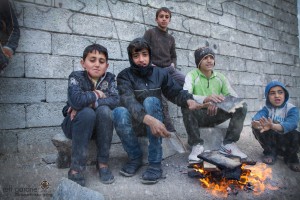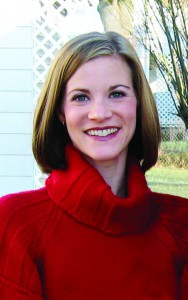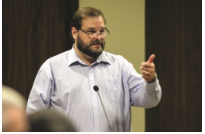
by Steve | Aug 31, 2016 | July-Aug2016, Magazine, Magazine Articles

With nowhere to stay, Assyrian children try to keep warm during Iraq’s long winder. Jeff Gardner, Picture Christians Project, www.picturechristians.org.
By Courtney Lott-
At the age of sixteen, the Lord met Nastaran Farahani in a vision. While in the shower, she heard a voice telling her to repent and that she would be washed of her sins. Though at first she did not understand, God would soon make clear the message he had sent. Around the same time, Nastaran’s sister, who was then living in Holland, also received a message. A woman she knew came to her after having a vision in which she saw three women sitting on a bed, putting their trust in Christ. This friend gave her a Bible and told her she must go visit her family in Iran.
“When she got home to our family, she opened her bag and brought out a Bible and said, ‘I believe in Jesus.’ And all my family started to cry,” says Nastaran. “And I told her, ‘I believe in Jesus, I know Jesus, I do not know how, but I know him. I do not have any questions.’”
In spite of their initial reaction, the Lord was at work in the Farahani family. Within two months both of her Muslim parents came to know Christ as well and they all began to attend church. At the time, church buildings were still open in Iran, but when persecution came, they were no longer safe. The family then decided to gather at home, thus starting a house church. This marked the beginning of a long and difficult road for Nastaran. After returning to Iran from Dubai, she and her husband, Yuna Sabet, were arrested.
“When we arrived, the officer checked our passport and then called my name,” Nastaran says. “He took my bag and started searching. Then someone else told him to take my husband’s passport too. They took us to the separate room with no window and started to interrogate us. Lots of my close friends had been arrested in the past. One was held in jail for nine months. They were constantly telling her that she would be executed. So it was really scary for me.”
Believing that Christians planned to work against the Iranian government, the officers questioned Nastaran about her cell group. They wanted the names of

An Assyrian Christian refugee, living in Zarqa, Jordan, struggles to keep her faith and hope burning. Thousands like her are waiting to return to their homes on the Nineveh Plain in northern Iraq. Jeff Gardner, Picture Christians Project, www.picturechristians.org.
members who might have been connected to people outside of Iran and asked her what her plan was. Eventually, they let Nastaran go but kept her passport so she could not leave. Two or three times they called her in for further interrogation and did not release her husband for three months. During this difficult time, however, the Lord sustained her with his word.
“When I was interrogated, the word of Jesus in Matthew 10:19 came to me,” says Nastaran. “I was so scared and when I’m afraid I cannot talk. But I was given what to say just as Jesus promised. I told them things that would not have come up to me on my own. They kept telling me that I am a liar. He tested me to see if my hands were shaking. He offered me tea but I didn’t drink because I heard many stories about how they would give women something to drink that would make them fall asleep. I also heard stories of them raping women in the jail. And I was so scared of that.”
When they finally returned her passport, she was told to leave and never come back. In 2011, after years of serving the Lord in many closed countries including Iran, Turkey, Dubai, Syria, and Lebanon, Nastaran and her husband came to the United States. They now live with their two daughters in California, working with Farsi speakers from Iran, Afghanistan, and Tajikistan through church planting. When asked how persecuted Christians feel about their Western brothers and sisters, Nastaran says that they do not feel abandoned, but do believe that they don’t appreciate the religious freedom they have.
“We know it’s not easy for those in other parts of the world to understand what life is like in Iran or countries like Iran because they live in freedom and they can worship God without the fear of being arrested,” Nastaran says. “However, these days because of the influence of…social media, it’s easier to know and to be aware of the condition of the people who live under persecution. For the same reason people in the West are becoming more aware and are getting more involved in helping their brothers and sisters, which I know is very encouraging to the people in Iran. I do not think the Iranians feel abandoned or uncared by other Christians in the West. Because, as you might know, there was some Christian prisoner who had been released as a result of Christian support in the West. However, they might think that people who do live in free countries do not really appreciate their freedom and take it for granted.”
Nastaran went on to say that there are many more ways the Western church can show up for their persecuted brothers and sisters, beyond using a hashtag to bring awareness. “You can keep praying for them. I know that there were people praying for me while I was going through that difficult time and it’s really encouraging, when you’re undergoing persecution, to know that your brothers and sisters are standing with you by their support, prayers, and also keeping your situation in the news. The governments like Iran are afraid of losing their face because of the [negative publicity] against them. So spreading the news of persecution can be a huge help and hopefully help release them. There are many ways we can help our brothers and sisters such as writing a letter to them, talking to the government officially, or helping their family outside of prison.”
Courtney Lott is the editorial assistant at Good News. For more information, check out Barnabasfund.org, Persecution.com, Christianresponse.org, worldmag.com/iraqaid, Opendoorsusa.org, Servantgroup.org, or E-n.org.uk.

by Steve | Aug 31, 2016 | July-Aug2016, Magazine, Magazine Articles

Elizabeth Glass Turner
By Elizabeth Glass Turner-
“Then justice will dwell in the wilderness, and righteousness abide in the fruitful field. The effect of righteousness will be peace, and the result of righteousness, quietness and trust forever.”
– Isaiah 32:16-17
The word righteousness isn’t one you see popping up on your Facebook and Twitter feed much these days.
Most people in North America would hear “righteous” and immediately translate it to “self-righteous.” And if there’s any taboo practice in an emerging or present post-Christendom culture, it’s self-righteousness: the inherent judgmental stance against others, in favor of yourself, based on supposed superiority of morality. Perhaps because of its very appearance and sound, there’s a halt, a slamming of the brakes. “Righteousness” begins visually and aurally, in English, with “right.” To say definitively that you’re immediately “right” in a pluralistic culture is a non-starter.
Of course “righteousness” doesn’t mean, “I’m right and therefore you’re wrong.” We speak here only of the instinctual response of the casual hearer who didn’t grow up hearing Psalms read from a teacher at the beginning of the public school day. “Righteousness” isn’t in our public vocabulary anymore.
To suggest a neutral or positive understanding of “righteousness” is challenge number one, and immediately we face challenge number two: the assertion that righteousness is the path to peace, that righteousness bears the promise of unsullied community. And yet this is what we read from Isaiah. While Old Testament scholars such as Drs. Sandra Richter and John Oswalt can give deeper insight to this passage in their commentaries, the 21st century reader still can’t escape this basic assertion: “The effect of righteousness will be peace, and the result of righteousness, quietness and trust forever.”
If there is a season in which Americans might be open to reconsidering the promise of righteousness, it might be now: now, when peace, quietness, and trust seem long ago and far-off. We hunger for peace, quietness, and trust. A truck plows through families celebrating in France, presidential campaigns are marred by inquiries, lawsuits, violence, and murky business dealings, a man following a law enforcement officer’s instructions is shot and killed in front of a four-year-old child, police officers are targeted and assassinated, a suicide bomber brings death and grief in Syria, and Baghdad, and Kabul, heroin scourges middle America, a teenager shoots up a church Bible study, a hostile nation steals information from our computers, an explosion rocks a German cafe, an agent teaching about cyber sex crimes accidentally catches a predator just in the few minutes she’s on a website during the seminar, a drone attack racks up significant “collateral damage,” a famous reporter admits embellishing an important story, veterans are returning with epidemic levels of PTSD, athletes’ performances are rigged with doping, the Zika virus decimates newborns.
The effect of righteousness will be peace, and the result of righteousness, quietness, and trust forever.
Glean from this verse a few quick observations: that righteousness exists; that righteousness has an effect; and that that effect is profoundly desirable.
In an age of global terrorism, we read: “the effect of righteousness will be peace, and the result of righteousness, quietness and trust forever.”
In the time-worn reality of immoral leaders, we read: “the effect of righteousness will be peace, and the result of righteousness, quietness and trust forever.”
In a century when you can wake up to bad news from all over the world instantly accessible on your night stand smart phone, we read: “the effect of righteousness will be peace, and the result of righteousness, quietness and trust forever.”
If this is what righteousness brings, it just might be worth pursuing.
Our society is beginning to think that the party might not have been worth the hangover. This is what “outgrowing” the Ten Commandments looks like. As well as shows with titles like “Scandal” and “Pretty Little Liars,” everyone really wants their friends to be trustworthy and their enemies to be honest. We want athletes’ performances to be honest (otherwise, what’s the fun of watching sports?), we want leaders who know that they too are under the law, we want our enemies to follow old rules of engagement that attempted to protect civilians from combat rather than deliberately targeting civilians.
In the end, we all really want peace, and trust. As we mature, we realize that the lure of drama to give self-importance is quickly hollow. Who doesn’t want a deep, profound sense of safety? And you cannot have true peace, quietness, and trust without righteousness, no matter what a political candidate says.
So the song, “Let There Be Peace on Earth, and Let It Begin with Me” is half right. But peace doesn’t begin with peace. Peace begins with righteousness: submitting to the boundaries of God’s covenant with us. Part of the whole theology of salvation that John Wesley preached to everyone – not just those with a head start in life, not just those with deep pockets who could help fund his ministry, but everyone – is the promise that God’s righteousness is good and just, that God’s righteousness fused with love has poured out to cover our unrighteousness, and that not only is our unrighteousness covered, but it can also be transformed. By God’s grace, we’re not only forgiven our unrighteousness, we’re empowered to live righteously.
“The effect of righteousness will be peace, and the result of righteousness, quietness and trust forever.” Creation groans, we eagerly await the fulfillment of the inbreaking Kingdom of God. Until that Day, we still live in a world with death and tears. But righteousness offers glimmers of that promise.
Do you want to live in a world of peace, quietness, and trust?
Put your faith in God, who will bring about his Kingdom where there will be no more crying or tears – and – live righteously. Do not covet, do not dishonor the Sabbath, do not give false witness, do not commit adultery, do not take on the name of God flippantly, do not dishonor your parents, and even more than these and the rest, love your enemies, walk farther than you are asked, don’t let your thoughts travel down dangerous roads even if you don’t act on them, think on things that are lovely and true and noble and trustworthy, discern and test, give thanks, pray constantly…
A tall order. “Peace, quietness, and trust aren’t possible, because no one can do all that,” you think. In the past one hundred years or so, Americans have set an ever-lowering bar for ourselves, shifting from being at least taught and trained and expected to adopt certain behaviors, to setting the training of our character aside, to saying, finally, that it’s just not possible and those who suggest it is are levying a moralistic power ploy. Make no mistake, as a society we’ve also improved significantly in many areas. But it is difficult to live the Christian life, and it is even more difficult if we do not train the character of our kids, ourselves, and each other.
Righteousness in part is character development. In part, it is accepting the grace of God that melts our hardened spirits and reforms us in Christlikeness. If I want to be part of a culture of righteousness, I must exert my will to pursue individual and communal character development, and I must also accept God’s transforming grace that will shape broken parts of me away from self-destruction and towards the Word Made Flesh.
“The effect of righteousness will be peace, and the result of righteousness, quietness and trust forever.”
So what are you doing to live a life of character and grace? Are your words honest and above-board? Do your thoughts betray ego or humility? Do you think certain standards are for others but not yourself? Are you both bold and gentle in your truth-speaking? Do you shift what you say in one context and change it in another, or at a different time, depending on how it serves your current desire?
Because the effect of righteousness? It’s peace. And the result of righteousness? Quietness and trust, forever.
Elizabeth Glass Turner is Associate Director of Community and Creative Development at World Methodist Evangelism and editor of WesleyanAccent.com. Reprinted by permission of WorldMethodist.org.

by Steve | Aug 31, 2016 | July-Aug2016, Magazine, Magazine Articles

Reed Hoppe
By Reed Hoppe-
In her twenty years as a missionary in Central Asia and India, Rachel* has experienced God work in miraculous ways. Her stories always captivate me – so different than my life in the southeastern United States. Both the Old Testament and the Book of Acts come alive as Rachel recounts God moving among her Indian colleagues.
Rachel’s pastor, Arnav*, is an Indian Christian from the northeastern region of the country. Curiously, Christianity has spread in this remote area, while much of the middle of India has remained least reached. Arnav explained how this came to be, telling the unlikely story of how one man impacted an entire region of India.
“Our great-great grandfathers were headhunters,” Arnav began rather matter-of-factly.
His logic wasn’t immediately clear to Rachel, or to me as I listened to her retell the story.
He went on, “In a headhunting culture, when a boy came of age, he had to kill a warrior from another tribe to prove his manhood. All of the villages were in remote areas of the jungle. A boy would have to survive his trek through the jungle, kill a warrior, and bring his head and other specific body parts back to the village. If he survived the journey, he stood on a rock in the center of the village and was inducted into the tribe as a man.”
“One day, a missionary came to the village. It was no use to kill him since he wasn’t a warrior, so the people of the tribe let him live. They harassed him to try and make him leave, but he wouldn’t go. One time, the elders locked him in a cage. When he was released, instead of leaving the village – which would have been expected – he brought his wife back to live with him there.
“Throughout the years that this missionary lived in the village, he only led one person from our tribe to Christ. That man ended up being one of the greatest evangelists in India. Entire villages came to the Lord through the ministry of this one man, a former headhunter.”
That lone missionary was ignored, harassed, and put into a cage but he never gave up. What must have felt like a failed ministry to him was actually the catalyst that brought millions of Indians to know Christ.
It’s easy to give up when we don’t see results as quickly as we would like. How many of us have given up on a diet after a few weeks? By summer, most people’s New Year’s resolutions have been long forgotten. So what is it that drives some people to persevere in the face of hardship?
I think it is because this man knew what he wanted to do with his life. The love of God within him drove him to what may seem like somewhat extreme measures to share that love with others. He sought to love God, love others, and make disciples.
In the local church, ministry often seems to consist of mere conflict management, budget issues, and endless meetings, rather than intentionally making disciples. Yet what drove nearly all of us into ministry was the desire to love God, love others, and make disciples.
As Rachel closed her story she said, “I was reminded that we don’t have to understand what God is doing to follow Him. We don’t have to see the future. God has a plan that He rarely reveals to us, but He is always working to bring people to know Him as Lord.”
Whether you serve in a local church in the U.S. or in the northeast of India, God is faithful. Let’s continue to encourage each other to persevere in the face of what sometimes feels like insignificance, and trust the Lord to work all things for good. One person, propelled by the love of God and enabled by the Holy Spirit, can impact an entire region for Christ. And sometimes, they may not even realize it.
*Pseudonyms used for security reasons.
Reed Hoppe serves as the associate director of communications for The Mission Society, is a deacon in the United Methodist Church, and serves with her husband in a church in Alabama.

by Steve | Aug 31, 2016 | July-Aug2016, Magazine Articles

B.J. Funk
By B.J. Funk-
I found a beautiful little nugget of gold resting in a spot I wouldn’t think gold would be. It’s an encouraging Scripture from 2 Kings 25 from which the title in my Bible reads The Fall of Jerusalem. Surely, we cannot find gold there, for this chapter tells of Nebuchadnezzar’s attack on Jerusalem and the subsequent removal of the Hebrews to Babylon. It is a dark period in Judah’s history, the beginning of 70 years of captivity. A golden nugget? Ah, yes.
It is painful to read of those who were executed and of Judah’s inhabitants becoming prisoners to Babylon. But the end of this chapter takes on a golden glow when we read of the decision of Nebuchadnezzar’s son, Evil-Merodach, to release Jehoiachin, king of Judah, who had worn prison clothes for 37 years. We are not privy to the reasons for this sudden compassion by Nebuchadnezzar’s son who followed as king of Babylon after his father’s death. Rumors by the Jews say that Nebuchadnezzar was mentally ill and even had his own son Evil-Merodach imprisoned for a while, during which time he became friends with Jehoiachin, also in prison. However this came about, it was due to the good providence of our good God.
The last verses of 2 Kings end with Evil-Merodach not only releasing Jehoiachin from prison, but speaking kindly to him and giving him a seat of honor higher than those of other kings who were with him in Babylon.
“So Jehoiachin put aside his prison clothes and for the rest of his life ate regularly at the king’s table. Day by day the king gave Jehoiachin a regular allowance.” This is the verse that jumped off the page of my Bible.
Most of us know what it feels like to be in a prison. Maybe not an actual prison, but a personal one, kept there by our poor choices or by the poor choices of others. We’ve lived there so long that we cannot imagine ever taking off our prison clothes. They have become stuck to us, glued to the conditions placed there by ourselves, hammered there by repeated failures, taped there by a continual stream of negatives in our lives. We have conditioned ourselves to expect the worse, and so if a leader suddenly looked at us and invited us to eat at his/her table, we would decide we weren’t worthy to be there. Right? We might continue our same unfortunate habits, our jump down into the pits around us, our never-ending determination that all life has for us is what we know now.
Jehoiachin tells us that does not have to be the case. You can take off your prison clothes and dine with the king. It is too beautiful to savor in just one reading. I have read it over and over, wishing that Christians caught inside of a prison could receive this good gospel news from an Old Testament story. You can give up your prison clothes! For the rest of your life, you are invited to eat regularly at the table of King Jesus, wearing clean robes of forgiveness!
In order to truly live our life in the fullest, it is important for us to die to our old self and to be renewed by putting on our new self, created after the likeness of God.
God can turn your prison into a palace. The day will come, at the end of time, when you and I will play the part of Jehoiachin. Jesus will open the dungeon doors of death, loose our prison clothes, and clothe us in immortality. He will say to us, “Come, sit at my Table for all eternity. You will reign with me.”
However, freedom can be yours now. You don’t have to wait. If your attitude of prison, with self-doubt, unforgiveness, and feelings of inferiority, has held you back, then Jehoiachin has a word for you: Take off your prison clothes, and dine at the King’s table.
Johoiachin had only two reasons that caused him to put his prison clothes aside. He had an invitation, and he accepted that invitation.
You have the same invitation. Will you accept?

by Steve | Aug 30, 2016 | In the News, Perspective E-Newsletter

Dr. Chris Ritter
The United Methodist News Service recently published a commentary by Glen Alton Messer II arguing that United Methodism encompasses “many theologies . . . united under ‘one big tent.'” Our friend the Rev. Chris Ritter, pastor at Geneseo UM Church in Geneseo, Illinois (Great Rivers Annual Conference), responded with the following critical review.
Do United Methodists Need a Bigger Tent?
By Chris Ritter
I just read “Methodism a ‘Big Tent’ from the Beginning” by Glen Alton Messer II. This historical analysis is one of a growing number of recent statements making the case, seemingly, for solving our current divisions by further expanding our tolerance for diversity of belief and practice. If a big tent is who we United Methodists are, why not go… bigger?
I primarily want to delve into Messer’s historical claims, but first let me say a word about the current project of re-defining Methodism. The energy around finding a new definition seems to emanate from those who find themselves drifting outside the established one (which is something like “churches, clergy, and conferences operating according to the Book of Discipline of the UMC”). Having failed to change our covenant by the established means, some are selectively ignoring that with which they disagree as they are shielded regionally from accountability.
To read Dr. Ritter’s entire message, click HERE.







